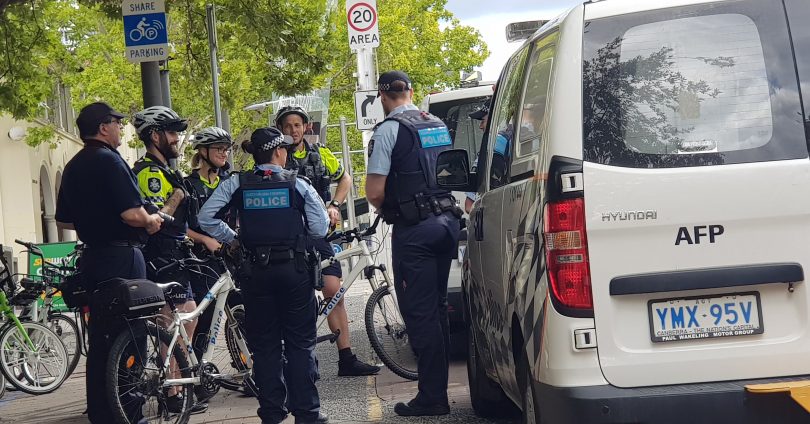
ACT police officers in Civic (pre-social distancing). Photo: Region Media.
The COVID-19 crisis has been the biggest news story in the world for months now, but RiotACT readers are divided on how much more news they can bear.
Amid several research projects into major news consumption and what you believe, we asked whether you are consuming more or less news during the COVID-19 crisis?
The answers were closely aligned on the 438 responses we received. You could choose to vote that you were consuming Less news: it’s all too sad, hard and depressing. This received 46 per cent of the total (or 199 votes).
Alternatively, you could vote for More news: I need to be as well informed as possible in unprecedented times. This received 54 per cent of the total (or 239 Votes).
This week we’re asking how you feel about the new laws making it an offence to assault a frontline service provider, including nurses and police, ambulance workers, firefighters, corrections officers and emergency services volunteers.
The ACT now has a specific offence for the assault of frontline workers, carrying a maximum two-year prison sentence. However that’s the same maximum sentence for common assault, the difference being that a criminal record will now record the specific charge.
New offences for driving at police and damaging a police vehicle have also passed the Legislative Assembly and carry a maximum prison sentence of 15 years and five years respectively.
Despite welcoming the changes and endorsing the move to have offences recorded on a criminal record, the Australian Federal Police Association (AFPA) has said the ACT Government should not be patting themselves on the back any time soon.
“Two years is the same as the rest of society … I understand the argument for that but we put ourselves out there every day exposed to the criminal element and people want to hurt us, so two years is nowhere near enough. It has to be raised up to five years.
“You can damage a police car, an inanimate object, and get five years, but if you assault a human being it is only two years. It seems a little bit imbalanced,” AFP Association president Angela Smith said this week.
Police Minister Mick Gentleman says the decision was undertaken in consultation with the Human Rights Commission, fulfilling obligations under the Human Rights Act 2004 to ensure that laws and policies in the ACT do not have a discriminatory, disproportionate or unintended impact on particular groups.
“A two-year imprisonment penalty balances protecting and supporting police and other frontline workers with ensuring we do not infringe on human rights,” he said.
Chewy agreed, saying “Whilst I have full respect for all police officers, they should not receive specific protection not available to other citizens. It looks bad and is far too open to abuse by those officers even though the vast majority of them are good people.
“We are all the same, no citizens should be given extra rights like this. The real problem is that assault punishments in general are far too lax for everyone.”
Nathan Lofthouse disagreed: “It’s a start, now amp it up to parity with the charge for damaging a police vehicle (up to 2 years for assault on a person, up to 5 for damaging the vehicle)”, he said.
Our question is:














